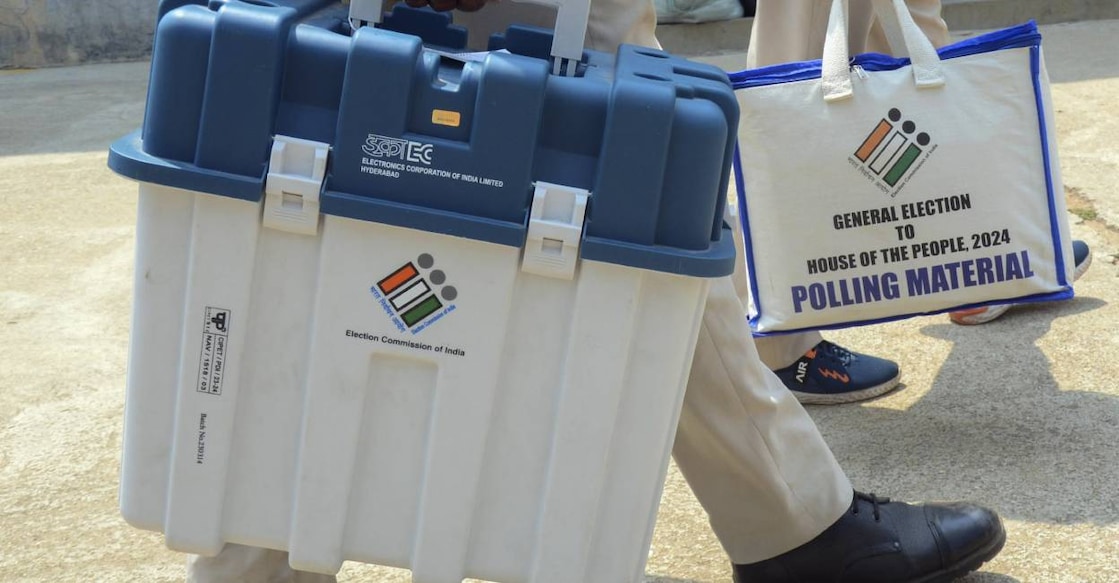EVM errors & replacement info intellectual property of ECI, cannot be shared, claims CEO in RTI reply

Mail This Article
Chief Electoral Officer, Kerala has refused to divulge crucial information on Electronic Voting machines (EVMs) that malfunctioned on voting day citing intellectual property clause. Reasons for replacing EVMs during the commissioning process ahead of elections and on actual polling day cannot be shared because the database is the intellectual property of the Election Commission of India (ECI) and that the ECI has not provided this information in public domain, the office of the Chief Electoral Officer (CEO), Kerala, has replied in response to a Right to Information (RTI) application filed by Onmanorama.
In the RTI query, Onmanorama sought information on the replacement of EVMs due to errors and reasons for replacement during the commissioning process and during the election held on April 26, 2024, and in the 2019 Lok Sabha polls. Onmanorama had sought constituency-wise, and year-wise details in the application.
According to the reply, the details regarding the reason for the replacement are uploaded directly by the respective returning officers in EMS 2.0, the IT application of the ECI. The ECI has not provided these data in the public domain. Database of IT applications falls under the intellectual property of the ECI and hence these details cannot be shared, the reply noted.
The state public information officer of the election department reiterates the reply regarding query on details regarding polling stations where the EVMs were replaced during the polls on April 26.
As per the reply, 230 ballot units, 855 control units and 1,187 VVPAT units were replaced during the commissioning process which involves setting up the voting machines with candidate names, photos, symbols, and serial numbers on the ballot papers, as well as the corresponding details on the VVPAT slips. The department has refused to provide information on the number of machines that had to be replaced on the actual polling day.
Onmanorama spoke to three intellectual property experts who expressed reservation on categorising EVM errors under intellectual property. “There is no exposition of trade secret or competitive interest involved in answering such a question. It is just a way of maintaining secrecy under the cover of IPR which in this case doesn't apply at all because the question is not about any patented subject, innovation or technological aspect,” said an IPR expert who did not want to be named. Another expert said that applicability of IPR may differ from case to case.
Venkatesh Nayak, director, the Commonwealth Human Rights Initiative, and a campaigner for transparency in EVM-related information, said all information about the replacement of the EVM-VVPAT combo in any polling station is required to be reported by the returning officer to the CEO and the ECI in Table-II format the day after polling is completed.
“This is an indispensable requirement of the documents scrutiny process. Error codes must be mentioned to explain about the faulty EVMs. All these documents are available for public inspection under Rule 93(2) of the Conduct of Election Rules, 1961. ECI is mandated to supply copies of such documents on payment of the requisite fee. There is no justifiable reason why the CEO's office should deny access to such information under the RTI Act. The CEO is mandated to conduct elections to the satisfaction of the electorate. Inventing silly excuses like protecting the IPR of some entity is a blatant violation of that mandate,” he said.
On April 17, Onmanorama reported that four EVMs printed out an extra VVPAT slip with BJP's lotus symbol during the commissioning process in Kasaragod. The district collector's report regarding the issue said that of the four VVPAT machines two were replaced due to technical problems. Kerala's CEO Sanjay Kaul issued a statement later that day saying that all the voting machines used in the Lok Sabha elections in the state were completely safe and flawless and that there was no need for any apprehensions. However, in the RTI reply, the office of the CEO doesn't even furnish data on machines which developed snags on the actual polling day.

Section 8 of the RTI Act on exemption from disclosure of information notes that there is no obligation to provide information, including commercial confidence, trade secrets or intellectual property, the disclosure of which would harm the competitive position of a third party. While the RTI reply doesn't make any mention of this section, even the applicability of this section is questionable because divulging data on EVM errors could no way harm the competitive position of any third party, also it involves public interest because it is a matter of a large democratic process.
According to the RTI reply, details on the replacement of EVMs are uploaded directly by the respective returning officers. The handbooks for presiding officers, returning officers and sector officers released by the ECI, however, show prescribed formats in the presiding officer's report which need to be prepared and given to sector officer following the replacement of units during mock and actual poll. According to the handbook, this format should contain the unique ID of units found non-functional, time of occurrence of defects, reason for non-functioning and unique ID of units given as replacement. Separate reports need to be filed by the presiding officer for replacement during mock and actual poll.


